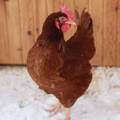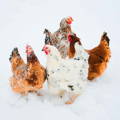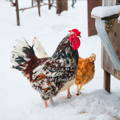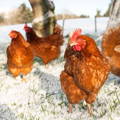
Subscribe
To join our mailing list and never miss an update!
As winter sets in, poultry farmers face the challenge of protecting their flocks from harsh weather conditions, particularly frostbite. Frostbite in chickens occurs when the comb, wattles, feet, or other exposed areas are subjected to freezing temperatures for prolonged periods.
While chickens are generally hardy birds, they are susceptible to frostbite, which can lead to tissue damage and, in severe cases, amputation or death. However, with proper prevention measures and timely treatment, the impact of frostbite can be minimized.
UNDERSTANDING FROSTBITE IN CHICKENS
Frostbite occurs when cold temperatures cause ice crystals to form in the tissues, leading to cell damage and reduced blood flow. Chickens are most vulnerable to frostbite on their combs, wattles, and feet, as these areas have less insulation and are more exposed to the elements. Additionally, humidity and wind chill can exacerbate the risk of frostbite.

POULTRY FROSTBITE PREVENTION
1. Provide Adequate Shelter:
Ensure that chicken coops are well-insulated and draft-free. Proper ventilation is crucial to prevent moisture buildup, which can increase the risk of frostbite. Bedding material such as straw or wood shavings can provide additional insulation.
2. Maintain Optimal Temperature:
Install heat lamps or radiant heaters in the coop to maintain a consistent temperature during cold spells. Monitor temperatures regularly and adjust heating sources as needed, taking care to prevent fire hazards.

3. Minimize Moisture:
Keep bedding clean and dry to prevent moisture from accumulating, as damp conditions can increase the likelihood of frostbite. Regularly replace wet bedding with dry material to maintain a healthy environment for your chickens.
4. Protect Exposed Areas:
Apply petroleum jelly or a commercial frostbite prevention product to the combs, wattles, and feet of chickens, especially those with large combs or breeds known to be more susceptible to frostbite. This creates a barrier that helps retain heat and prevents moisture from freezing on the skin.
5. Monitor Weather Conditions:
Stay informed about upcoming weather forecasts and take proactive measures to protect your flock during periods of extreme cold. Consider using tarps or additional insulation to shield the coop from harsh winds.
POULTRY FROSTBITE TREATMENT

Trending Articles


In conclusion, safeguarding your poultry from frostbite demands diligence and proactive measures. By implementing preventive strategies and promptly addressing any signs of frostbite, you can ensure the well-being and resilience of your flock throughout the winter months.
Early detection and appropriate intervention are key to minimizing tissue damage and ensuring the health and well-being of your chickens. Remember to consult with a veterinarian if you have any concerns or if frostbite symptoms persist despite treatment efforts. With diligent care and attention, you can help your chickens thrive even in the coldest of climates.
Trending Products
Copyright©2024 All rights reserved. We love to have you share our article as long as you include a direct link to this page. This article or any portion thereof , including all images, may not be reproduced or used in any manner whatsoever without the express written permission of Gypsy Shoals Farm.



